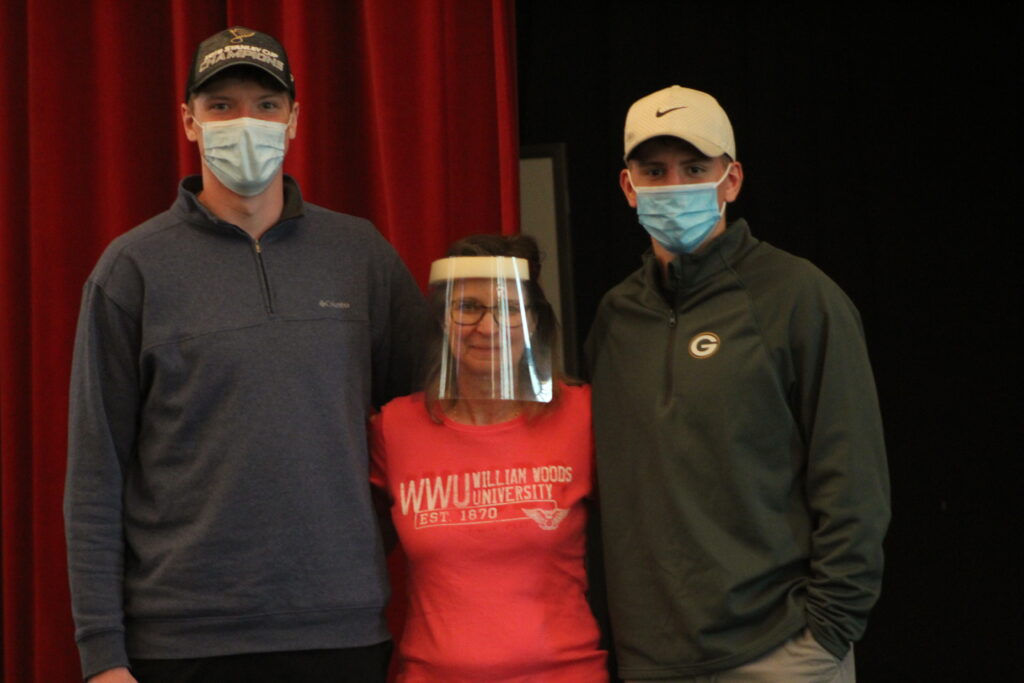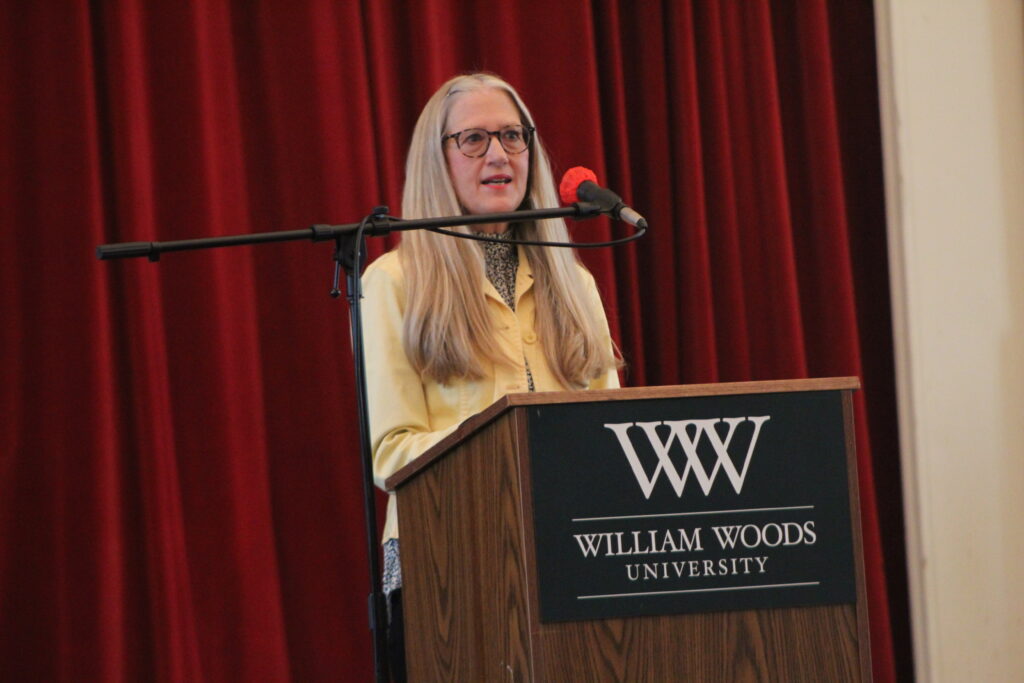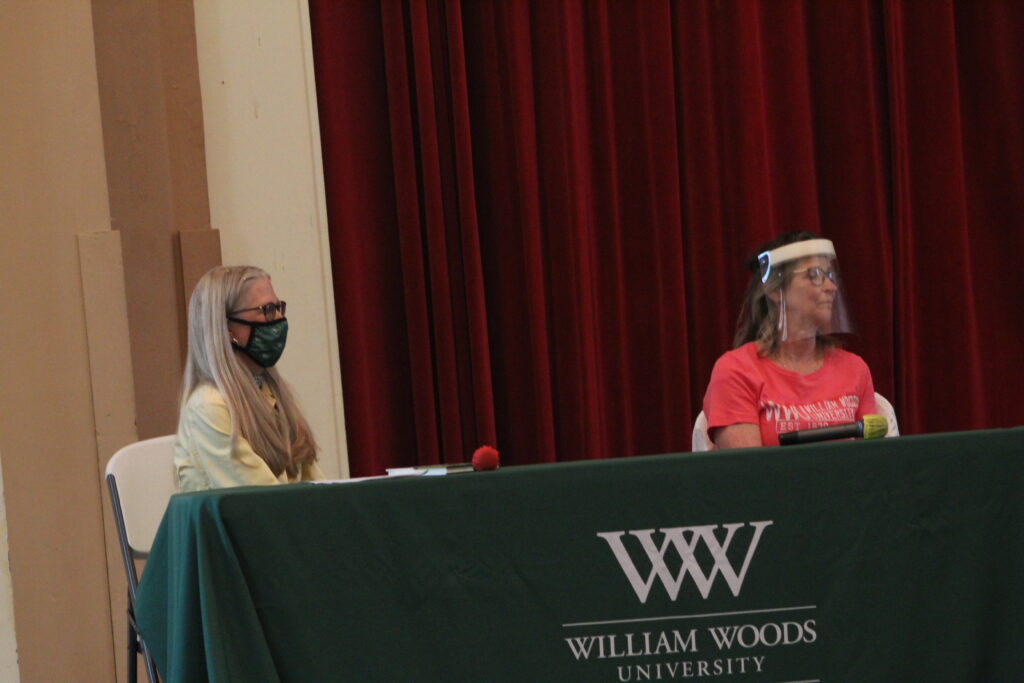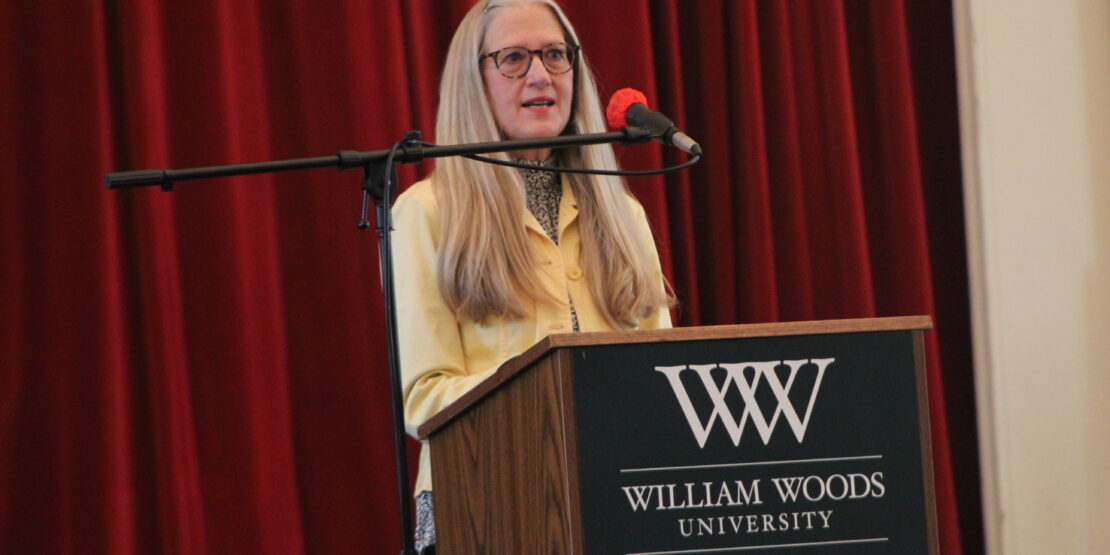One of the rites of the end of the Spring semester at William Woods is the “Last Lecture,” when retiring professors provide parting thoughts on their careers, time at The Woods, futures and a little bit of advice. After highly successful careers as professors at WWU, Assistant Professor of Business Brenda Popp and Associate Professor of Education Leslie Trogdon are both retiring. They became the latest departing faculty members to take part in the tradition earlier this month when they shared their last co-lecture together at a LEAD event.
Brenda Popp- Assistant Professor of Business
After flourishing in the business sector for about 20 years, Popp went back to school at Lincoln University to earn her master’s degree in business with intentions of beginning a new career in the financial world. During her MBA, she tutored undergraduates and found she could help students understand difficult finance concepts by using real life examples. Then the unthinkable happened before she started her last semester: Popp’s 19-year-old son was killed in a car accident. Popp recalls that the Lincoln University graduate faculty and her advisor, Dr. Linhardt, were amazingly supportive during that last semester, even offering her a one-year teaching position just to give her some time to get her footing.

Little did Mrs. Popp realize that one of her students would change her life forever. The student was a graduating William Woods baseball player who needed Popp’s spring class at LU because the course Corporate Finance was not offered at The Woods. However, he told Popp that he could not make every class due to his baseball schedule. So Popp offered to work with his schedule by providing extra tutoring on the days he could attend class. From the relationship built through the tutoring sessions, the WWU pitcher urged Popp to apply for an open teaching position at WWU and she did.
When arriving for her teaching demonstration and interview, Popp was greeted by a crowded room of students along with the business faculty. At the end of the demonstration, the students wrote great reviews about Popp, which would be the primary reason she would get hired. Later Popp learned from the baseball player that he had asked his girlfriend and her sorority sisters to come to the demonstration and write great reviews so Popp could be hired.
“A baseball player from Iowa changed my life and I hope I have changed many students lives,” Popp said.
Interestingly, Travis Tamerius told the audience at the LEAD event that one of the faculty members at the demonstration was Associate Professor of Business, David Forster. He told Travis that he had checked “no” for hiring Popp. However, over the next few years, Forster and Popp became good friends and close colleagues.
“Brenda always brings her best and I have enjoyed every minute of having her in the business department,” Forester said. “She has made a lasting impression and goes above and beyond for the students.”
During her 20-year tenure, she has received positive praise and the school’s top award Louis D. Beaumont Dad’s Association Distinguished Professor Award in 2004 and 2017.
At a recent interview, Popp recalled that in her first two weeks of teaching at WWU, she remembered watching New York City’s World Trade Center buildings collapse during the terrorist attacks on 9/11/2001 on one of the Burton Building televisions. She had been assigned to teach International Business at that time, and she recalled that when she walked into class on 9/12, the room was split with international students representing India, Sweden, Algeria and Venezuela sitting on one side of the room, and students from the United States on the other side. Popp heard the two international students say they did not know why Americans were all surprised that the attacks took place. Popp recalled that one of the American students became unglued and was ready to fight them.
“Needless to say, following that day, we had a lot of discussions about the impacts of 9/11,” Popp said. “I refocused the course to less about international trade and more about cultural differences. I had to be careful about what I said and ensure that everyone respected each other’s opinions. It was a challenging semester, but by the end of the semester, we all came together with a better understanding of each other. It is crazy to think about that being my first real semester and what it was like.”
Popp’s favorite part of teaching are the students and the challenge of making those light bulbs go off in their head. If there are students that do not seem interested, Popp will try to go to events to support them.
“I show up to my students’ art shows, theatre productions, soccer or basketball games,” Popp said. “Students may see that I am interested in them and maybe they will be more interested in finance.”
In her last year, Popp has been tackling the challenge of teaching during the Coronavirus pandemic. She was able to utilize technology to do things that could not have been done before this school year. For example, once a week during the fall semester, Popp would Zoom with a Scottish student in a one-on-one session for 30 to 45 minutes. The first thing that Popp would ask would be how the student’s family was doing and how things were going in the student’s community. She would also provide an update on how things were going at WWU. Then, they would talk about assignments and what the student had to do to be successful in her class.
“That was an opportunity I would not have if we did not have the pandemic,” Popp said. “There are always opportunities no matter the situation. I had to change some of the ways I have done things. It has been hard because I like to have that in-person interaction with students. Life is a challenge, and all of us must find ways to adapt.”
Over the last 20 years, Popp has visited many countries in the world including France, China, Russia, and Venezuela. In fact, she spent two weeks in the Republic of Georgia with one of her advisees. However, there are still different countries Popp has on her bucket list. Her intention is to visit countries of her former international students.
“Over the years, I have told some of my students that when I visit your country, your mom owes me a good cup of coffee,” Popp said.
They all have assured her their homes are always open to her and Mr. Popp. Some of those countries include Spain, Brazil, and Colombia.
Leslie Trogdon- Associate Professor of Education
Leslie Trogdon is a mastermind in the education field who came to The Woods after working in the Columbia (Mo.) Public School District for many years. At age 58, she returned to William Woods to earn her Doctorate in Education and started to teach classes after earning her degree in various doctoral co-horts around the state.

“There is a great feeling of working 35+ years with all the knowledge gained from my experience in the schools,” Trogdon said. ”Sharing the experiences with other up and coming educators has been an ideal situation.”
In her first class as a professor at WWU, she spent a lot of time getting to know her students. Trogdon asked the students how their school district has changed in the last few years and had the students hypothesize on why they thought those changes happened. The activity helped them to reflect on what schools were like five years ago compared to now.
“What I believe I model for students is empathy, as I think they understand that I am an active listener who tries to place myself in their shoes,” Trogdon said. “For example, when I am teaching in a rural area of the state, though my background experience is not in rural education, I strive to put myself in their shoes and try to understand where they are coming from.”
Her classes are rigorous and are based on combining theory with relevant learning opportunities. Trogdon’s students must get themselves inside the minds of their own students they serve, think about their challenges in their school and apply that to a rigorous course. Trogdon’s students apply methods and skills learned in class to solve an advanced issue in their district. Her classes utilize case studies, exercises, and conversations to interact with the theory and concepts they have learned from their past experiences.
“The problem-solving types of skills practiced in class are needed to address educational challenges in schools and encourages students to use and walk toward wisdom,” Trogdon said. “My students learn when to apply the knowledge and life lessons at the right time when needed, so that their wisdom accumulated over time becomes automatic to address educational challenges. This gives my students as leaders the ability to not have to spend hours thinking about how to address challenges at their schools as they will already have that information from their experiences.”
As a positive role model and servant leader, Trogdon wants students to remember to always be a reflective practitioner and a reflective learner by always accepting feedback from others. She wants them to remember to continually analyze the decisions they make as leaders by asking themselves: what should I start doing, continue doing, and stop doing to ensure they can be effective in the world.
“I would tell my younger self to be confident and do the best you can as you begin your career, know that you can always get help from others and keep an open mind to feedback and suggestions so that you can grow and improve,” Trogdon said. “Teaching and leading is one of the hardest jobs one can ever have as the human mind is complex. All students, schools and cultures are different. Leaders must work together to design the best learning experiences, so we can reach each and every student.”
After retirement, Trogdon wants to spend more time with family and that includes traveling to see her son more often.

Both Trodgon and Popp will be dearly missed by WWU students. They have made a huge impact on those around them. The two educators showcase how professors at WWU go above and beyond to ensure students are successful inside and outside the classroom. No matter what happens after their experience at WWU, they are going to retire remembering the joy students in their classes brought to them, and how they did the same for them.

